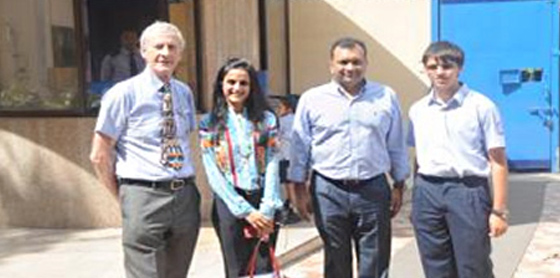Talk by Mr. Amit Jatia
On the 10th of October, Mr and Mrs Amit and Smita Jatia shared with us three key mantras that they picked up on their journey with McDonalds. Mr Amit Jatia is the vice-chairman of McDonalds in West and South India, and Mrs Smita is the managing director of the same company. McDonalds is one of the largest and most valuable brands worldwide, and Mr Jatia explained the challenge of running a global brand in a local context, or “glocally,” as he put it. McDonalds had to think as a global brand, but run like a local retailer. Through the 3 advertisements that were shown, it was easy to see how McDonalds progressed over the years as its presence in India grew.

On the 10th of October, Mr and Mrs Amit and Smita Jatia shared with us three key mantras that they picked up on their journey with McDonalds. Mr Amit Jatia is the vice-chairman of McDonalds in West and South India, and Mrs Smita is the managing director of the same company. McDonalds is one of the largest and most valuable brands worldwide, and Mr Jatia explained the challenge of running a global brand in a local context, or “glocally,” as he put it. McDonalds had to think as a global brand, but run like a local retailer. Through the 3 advertisements that were shown, it was easy to see how McDonalds progressed over the years as its presence in India grew.

The first mantra is to have courage. When McDonald’s was planning its foray in India, they faced governmental opposition as computer chips were more in demand than their potato equivalents made by McDonalds. There was no market for fast food either, as India has several different regional tastes that differ from state to state. The other challenge that had to be overcome was the requirement of massive investment. It required great courage to get the initiative going. Secondly, as Mr Jatia put it, Rome was not built in a day. It required 10 years to set up the ecosystem to grow the right quality of potatoes in India. When a building is to be built, first you have to dig downward and make a strong foundation. Similarly, McDonalds took the time and went slow while opening the first few stores. However, their courage has paid off and today they have a solid platform and are currently on an accelerated pace, opening several new stores every year. The third mantra focused on the importance of realising that what worked for you in the past will not necessarily work for you today. McDonalds, as a brand, remained stuck with its 2003 policies, while the customer moved on, which eventually prompted a global re-think of McDonalds’ branding worldwide.
Mr and Mrs Jatia were kind enough to answer several questions from the students. They spoke about how they were able to persuade people eat out more often instead of just staying at home and eating home-cooked food. A particularly observant student noted that he had witnessed McDonald’s employees greeting customers with a ‘Namaste.’ Mr and Mrs Jatia explained that this was implemented recently so that local customers do not feel intimidated when they enter a McDonalds store. Customers such as students of our school who are well travelled are already familiar with McDonalds and are comfortable walking into the store. Therefore, by ensuring that they are greeted with a Namaste, these customers feel at ease enjoying the McDonalds experience.
Keeping an Indian taste for a global product was a key ingredient of their success. Simply offering a un-original Indian product such as a vada-pav would not have worked for them. However, offering a unique, global product with an Indian taste and feel to it was the most successful option for them. Through their presentation, Mr and Mrs Jatia demonstrated how a brand can be built and stabilised in an unfamiliar market, and remain successful despite facing several obstacles. Students studying business or economics found the lecture particularly interesting, as it demonstrated the real-world applications of some of the concepts and theories that they studied in class.


